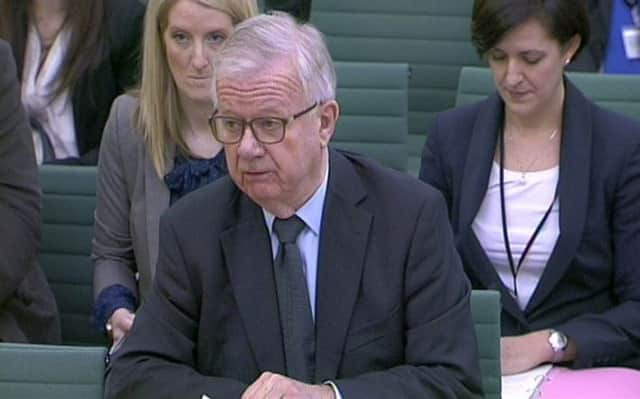Tom Richmond: Chilcot the fall guy as MPs play pass the buck on Iraq


Like those brave men and women sent into battle with woefully inadequate equipment – Sgt Steve Roberts, of Shipley, was the first British fatality in 2003 – to seek non-existent weapons of mass destruction, Sir John has been hung out to dry by his political masters.
The reason is this. When launching the inquiry, Gordon Brown made sure that it would not report until after the 2010 election – it was not in Labour’s interests for the country to be reminded about “dodgy dossiers” and so on.
Advertisement
Hide AdAdvertisement
Hide AdAnd please do not be fooled by the Prime Minister’s protestation that he, too, wants the Chilcot report to be published before polling day – the Tories do not want the electorate to be reminded about how a cohort of dewy-eyed backbenchers, led by David Cameron and George Osborne, voted to send troops into war on the say-so of Tony Blair/Bliar (delete as appropriate) and then led the applause in the Commons when the former PM stepped down in 2007.
In short, the political establishment is more than happy for Sir John to be their fall guy – and MPs on the Foreign Affairs Committee made certain of this when they harangued him for his apparent mismanagement of the inquiry.
Yet the truth of the matter is that Sir John and his team simply did not envisage the scale of the task asked of them six long years ago. Effectively, they are being expected to ask the questions that Parliamentarians did not pose with sufficient rigour, or diligence, when the invasion and occupation of Iraq became inevitable after 9/11.
This became abundantly clear last Thursday when David Davis, the Haltemprice and Howden MP, led a Commons debate calling for a timetable for the completion of the Chilcot inquiry to be published by next week.
Advertisement
Hide AdAdvertisement
Hide AdEven though the motion was more conciliatory than the original wording which sought the report’s immediate publication, it was still sufficient to highlight Parliament’s inadequacies prior to Iraq. Take this admission from the SNP’s Pete Wishart as he recalled Mr Blair’s fateful pre-invasion speech to Parliament: “I was a whip that day, and I remember lots of good women and men being dragooned into the Lobby – against their better judgment – to support the Prime Minister and the fabrication of a case on Iraq.
“It was a horrible day – a day that should be ingrained in the collective consciousness of this House and remembered for its eternal shame.”
He was not alone. Labour’s Kate Hoey was among those “pushed and cajoled” and she spoke for many when she said that the Commons “must always be very careful that the whips and the party machine do not always get their way”.
The answer could not be more simple – MPs should be entitled to a free vote if they find themselves in the unfortunate position of being asked by a future government to send UK service personnel into battle. This should be treated as a matter of conscience, like Tuesday’s vote on “three parent” IVF techniques.
Advertisement
Hide AdAdvertisement
Hide AdOf course, it was slightly disingenuous of the aforementioned David Davis, the debate’s instigator, to compare Chilcot unfavourably to the Franks report which took six months to examine the conduct of the 1982 Falklands conflict – the latter was predominantly led by senior politicians, including the former Home Secretary and Leeds MP Merlyn Rees, and it met in secret. That would be unacceptable today.
But Mr Davis is right to provide this context: “Since the announcement of the inquiry, three major foreign policy decisions would have greatly benefited from the lessons that arose from the Iraq war. In Libya we undertook a military intervention that was intended to prevent a massacre, quite properly. It was successful, but it was the precursor to protracted conflict and unrest following our nominal military victory. In Syria, the Government were blocked by the House of Commons from military intervention, an intervention that would have led us to be the military supporters of our now sworn enemies, ISIS. And now in Iraq the UK has become embroiled in the ongoing civil war that has raged since the invasion in 2003.”
In this regard, the Chilcot report is long overdue because of its potential to shape and influence future decision-making – Mr Davis’s withering assertion can be surmised as “how not to run a foreign policy”.
However, this should not excuse MPs from their collective inability to put in place more effective measures to scrutinise foreign affairs.
Advertisement
Hide AdAdvertisement
Hide AdWar is a matter of a life and death, and it should not require Chilcot’s belated report to remind the Prime Minister, and each and every MP, that they cannot abdicate their own responsibilities when deciding whether to send our Armed Forces into battle – or not. It is time that they, too, started leading from the front rather than blaming others.